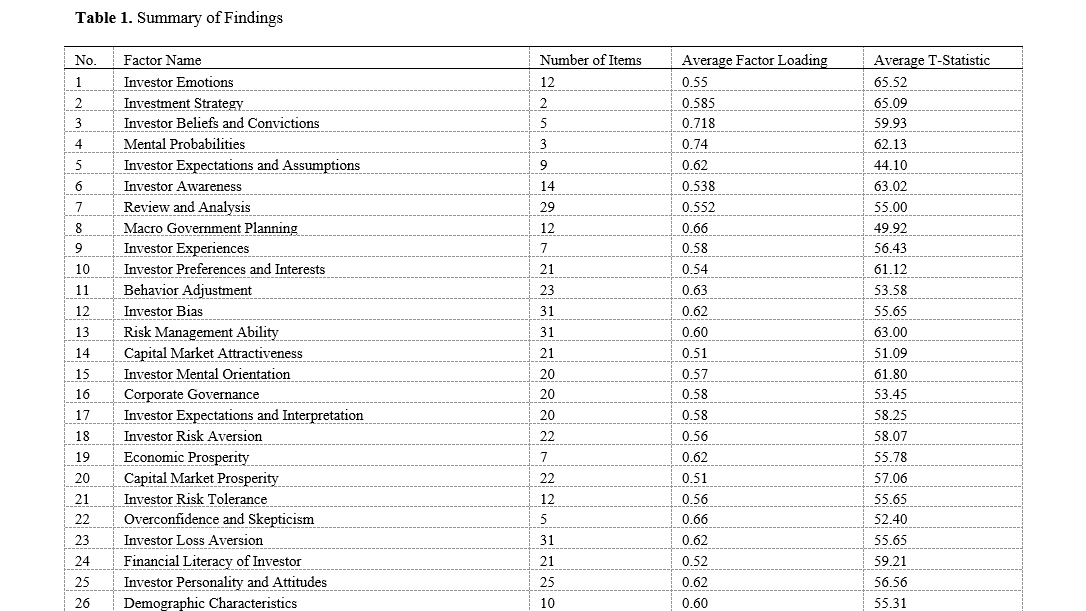Using Mental Accounting in Optimal Portfolio Selection
Keywords:
Accounting, mental accounting, optimal portfolioAbstract
The objective of the present study is to employ mental accounting in the selection of an optimal portfolio. This study is applied in its objective and employs a descriptive-survey method in its research methodology. The statistical population consisted of all professional accountants. Sampling was conducted using simple random sampling. A sample of 200 individuals participated. The data collection instrument was a researcher-developed questionnaire, and for data analysis, structural equation modeling and interpretive structural methods were utilized using SPSS, LISREL, and Excel software. A questionnaire comprising 46 indicators affecting mental accounting was administered to members of an expert group, and the fuzzy Delphi results indicated the elimination of six indicators (Maslow's hierarchy of needs, barriers to investment in other sectors, self-efficacy, enhancement of community health, consumption and saving patterns, investor peace of mind). Based on the results obtained from exploratory and confirmatory factor analyses, all 40 indicators were validated as factors influencing mental accounting. Subsequently, the interpretive structural model was utilized. According to the results, level 12, which includes criterion number 40, is identified as the most influential level, directly affecting the criteria at level 11. Level one is selected as the most influenced level, which comprises nine indicators. Additionally, indicators within the same level have mutual, pairwise influences on each other. Finally, to assess the model's validity and the accuracy of the findings, the member-checking strategy was employed, and its results confirmed the model's validity. Based on the results, investors should adopt a mental accounting approach for the entire portfolio and set longer-term objectives.
References
Y. Chaleenutthawut, "Loan Portfolio Dataset From MakerDAO Blockchain Project," Ieee Access, vol. 12, pp. 24843-24854, 2024, doi: 10.1109/access.2024.3363225.
Y. He, "A Study of Factors Influencing Investor Expectations in the Capital Market," SHS Web of Conferences, vol. 188, p. 01020, 2024, doi: 10.1051/shsconf/202418801020.
L. Carvalho, "Socially Responsible Investment Funds—An Analysis Applied to Funds Domiciled in the Portuguese and Spanish Markets," Risks, vol. 12, no. 1, p. 9, 2024, doi: 10.3390/risks12010009.
E. K. Chowdhury, "Do weather patterns effect investment decisions in the stock market? A South Asian perspective," Journal of Asset Management, vol. 25, no. 2, pp. 162-171, 2024, doi: 10.1057/s41260-023-00334-z.
F. Nikoo Sedeh, S. Shams, and M. Seyghali, "Modeling the Optimal Stock Portfolio Selection Based on Risk Assessment and Behavioral Finance Approach (Mental Accounting) in the Tehran Stock Exchange," Journal of Financial Management Outlook, vol. 10, no. 31, pp. 75-101, 2020, doi: 10.52547/jfmp.10.31.75.
V. Furrer, F. Mumenthaler, S. Valkanover, M. Eckhart, and S. Nagel, "On the Relationship Between Teacher Attitudes Toward Inclusive Physical Education and Children's Social Interactions," Journal of Primary Education Research, vol. 14, pp. 237-256, 2021.
E. A. Gordon, E. Henry, B. N. Jorgensen, and C. L. Linthicum, "Flexibility in Cash-Flow Classification under IFRS: Determinants and Consequences," Review of Accounting Studies, vol. 22, pp. 839-872, 2017, doi: 10.1007/s11142-017-9387-1.
A. Chen and J. J. Gong, "Accounting Comparability, Financial Reporting Quality, and the Pricing of Accruals," Advances in Accounting, vol. 45, p. 100415, 2019, doi: 10.1016/j.adiac.2019.03.003.
D. Messaoud, A. Ben Amar, and Y. Boujelbene, "Investor sentiment and liquidity in emerging stock markets," Journal of Economic and Administrative Sciences, vol. 39, no. 4, pp. 867-891, 2023, doi: 10.1108/JEAS-11-2020-0198.
B. Y. Almansour, S. Elkrghli, and A. Y. Almansour, "Unravelling the Complexities of Cryptocurrency Investment Decisions: A Behavioral Finance Perspective From Gulf Investors," International Journal of Professional Business Review, vol. 8, no. 7, p. e03265, 2023, doi: 10.26668/businessreview/2023.v8i7.3265.
G. Gu, "The Dynamic Interplay of Market Forces and Human Behavior: A Critical Review of Efficient Market Hypothesis and Behavioral Finance," Advances in Economics Management and Political Sciences, vol. 31, no. 1, pp. 54-59, 2023, doi: 10.54254/2754-1169/31/20231498.
E. A. Mohammad, "The Economics of Behavioral Finance and Its Effects on Investment Decisions in Kurdistan Region of Iraq for the Period 2020-2022," Koya University Journal of Humanities and Social Sciences, vol. 6, no. 1, pp. 88-94, 2023, doi: 10.14500/kujhss.v6n1y2023.pp88-94.
K. Sood, "Behavioral Finance and Investor Types: Managing Behavior to Make Better Investment Decisions," Qualitative Research in Financial Markets, vol. 15, no. 5, pp. 907-912, 2023, doi: 10.1108/qrfm-11-2023-237.
F. Yasmin and J. Ferdaous, "Behavioral Biases Affecting Investment Decisions of Capital Market Investors in Bangladesh: A Behavioral Finance Approach," Investment Management and Financial Innovations, vol. 20, no. 2, pp. 149-159, 2023, doi: 10.21511/imfi.20(2).2023.13.
M. Dadashi, N. Rezaei, A. Pak Maram, and R. Abdi, "Presentation of a Behavioral Model for Decision Making in Accounting Based on Psychological Components through Structural Equations," Journal of Islamic Economics and Banking, vol. 11, no. 38, pp. 137-158, 2022.
T. Saha, S. K. Das, M. M. Rahman, F. K. Siddique, and M. G. Uddin, "Prospects and Challenges of Implementing Cloud Accounting in Bangladesh," The Journal of Asian Finance, Economics and Business, vol. 7, no. 12, pp. 275-282, 2020, doi: 10.13106/jafeb.2020.vol7.no12.275.
Y. A. Jasim and M. B. Raewf, "Information Technology's Impact on the Accounting System," Cihan University-Erbil Journal of Humanities and Social Sciences, vol. 4, no. 1, pp. 50-57, 2020, doi: 10.24086/cuejhss.v4n1y2020.pp50-57.
F. O. Nwokike and G. M. Eya, "A Comparative Study of the Perceptions of Accounting Educators and Accountants on Skills Required of Accounting Education Graduates in Automated Offices," World Journal of Education, vol. 5, no. 5, pp. 64-70, 2015, doi: 10.5430/wje.v5n5p64.
G. Leoni et al., "The Pervasive Role of Accounting and Accountability During the COVID-19 Emergency," Accounting, Auditing & Accountability Journal, vol. 35, no. 1, pp. 1-19, 2022, doi: 10.1108/AAAJ-10-2021-5493.
H. Rezaei and M. Aghabayi Jazani, "The Necessity of Managing Deposit Portfolios with an Approach to Restructuring the Resources of Banks Listed on the Tehran Stock Exchange," Journal of Islamic Economics and Banking, vol. 10, no. 37, pp. 445-483, 2021.
S. Kumar and N. Goyal, "Behavioral Biases in Investment Decision Making - A Systematic Literature Review," Qualitative Research in Financial Markets, vol. 7, no. 1, pp. 88-108, 2015, doi: 10.1108/QRFM-07-2014-0022.
J. F. Casta and O. Ramond, "Financial Reporting and Fair Value: Where Do We Stand?," in IFRS in a Global World: International and Critical Perspectives on Accounting, 2016, pp. 57-70.












